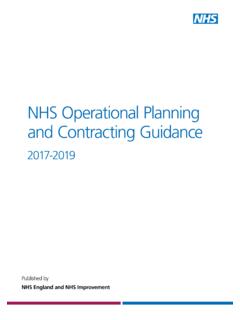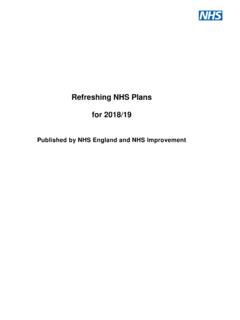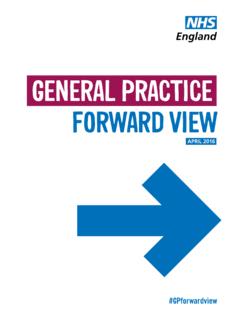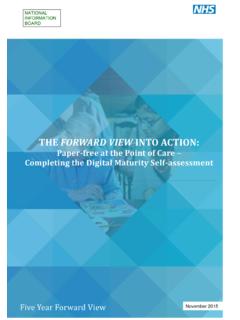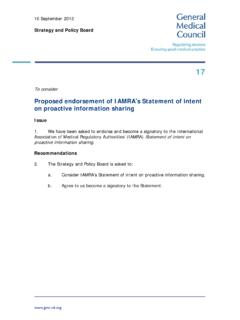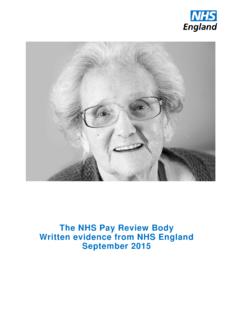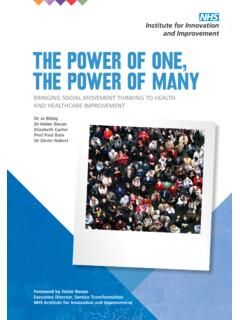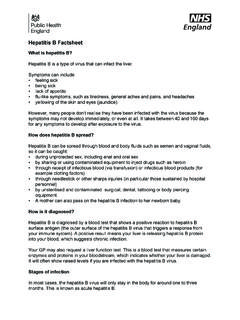Transcription of Managing Conflicts of Interest in the NHS - NHS England
1 Managing Conflicts of Interest in the NHS. Guidance for staff and organisations Publications Gateway Reference: 06419. NHS England INFORMATION READER BOX. Directorate Medical Operations and Information Specialised Commissioning Nursing Trans. & Corp. Ops. Commissioning Strategy Finance Publications Gateway Reference: 0. Document Purpose Guidance Document Name Managing Conflicts of Interest in the NHS. Author NHS England Publication Date 07 February 2017. Target Audience CCG Clinical Leaders, CCG Accountable Officers, CSU Managing Directors, Foundation Trust CEs , Medical Directors, Directors of Nursing, NHS Trust Board Chairs, NHS England Regional Directors, NHS England Directors of Commissioning Operations, All NHS England Employees, Directors of HR, Directors of Finance, NHS Trust CEs Additional Circulation Care Trust CEs, GPs List Description This guidance provides guidance for the management of Conflicts of Interest in the NHS.
2 It is applicable to Clinical Commissioning Groups, NHS Trusts and NHS. Foundation Trusts and NHS England . Other bodies involved in the provision of NHS services are invited to consider implementing this guidance. Cross Reference Managing Conflicts of Interest : Revised Statutory Guidance for CCGs Superseded Docs 0. (if applicable). Action Required Review and update existing relevant organisational policies. Timing / Deadlines This guidance comes into force 1 June 2017. (if applicable). Contact Details for further information 0. 0. Document Status This is a controlled document. Whilst this document may be printed, the electronic version posted on the intranet is the controlled copy. Any printed copies of this document are not controlled. As a controlled document, this document should not be saved onto local or network drives but should always be accessed from the intranet.
3 Scope of this guidance This guidance is intended to protect patients, taxpayers and staff covering health services in which there is a direct state Interest . It comes into force on 1 June 2017. It is applicable to the following NHS bodies: Clinical Commissioning Groups ( CCGs'). NHS Trusts (all or most of whose hospitals establishments and facilities are situated in England ) and NHS. Foundation Trusts - which include secondary care trusts, mental health trusts, community trusts, and ambulance trusts NHS England For the purposes of this guidance these bodies are referred to as organisations'. The principles of this guidance will be included in a revised version of the statutory guidance for CCGs issued by NHS England pursuant to its powers under and of the National Health Service Act 2006. Until this guidance comes into force existing guidance issued under these powers continues to apply, and is accessible at.
4 NHS Trusts and NHS Foundation Trusts must have regard to this guidance through its incorporation into the NHS. Standard Contract pursuant to General Condition 27. Its applicability to NHS England will be delivered through amendments to our Standards of Business Conduct. This guidance does not apply to bodies not listed above ( independent and private sector organisations, general practices*, social enterprises, community pharmacies, community dental practices, optical providers, local authorities who are subject to different legislative and governance requirements). However, the boards/governing bodies of these organisations are invited to consider implementing the guidance as a means to effectively manage Conflicts of Interest and provide safeguards for their staff. The requirements of of the generic NHS Standard Contract (2017/18 and 2018/19 edition) should be interpreted in that light.
5 * However, GP practice staff should note that the requirements in the statutory guidance for CCGs on the management of Conflicts of Interest (referred to above) continue to apply to GP partners (or where the practice is a company, each director) and individuals in a practice directly involved with the business or decision making of their CCG. 3. Contents 1 Purpose 2 Action 3 Definitions 4 Declarations 5 Management 6 Transparency 7 Breaches 8 Resource annexes 4. 1. Purpose Every year the taxpayer entrusts NHS organisations with over 110 billion to care for millions of people. This money must be spent well, free from undue influence. To deliver high quality and innovative care organisations need to work collaboratively with each other, local authorities, industry and other public, private and voluntary bodies.
6 Partnership working brings many benefits, but also creates the risk of Conflicts of Interest . Organisations and the people who work with, for, and on behalf of them (referred to as staff' in this guidance) want to manage these risks in the right way. Staff and organisations may already be taking steps to do this. However, how this should be done has not always been made clear and there is variation in current practice implementation of this guidance will make things easier and enable greater consistency across the NHS. By implementing this guidance staff and organisations will understand what to do to take the best action and protect themselves from allegations that they have acted inappropriately. This guidance: Introduces consistent principles and rules for Managing Conflicts of Interest . Provides simple advice to staff and organisations about what to do in common situations.
7 Supports good judgement about how interests should be approached and managed. 5. 2. Action: What should staff and organisations do? Action for staff Action for organisations DO DO. Familiarise yourself with this guidance and your Ensure that you have clear and well communicated organisational policies and follow them. processes in place to help staff understand what they need Use your common sense and judgement to consider to do. whether the interests you have could affect the way Identify a team or individual with responsibility for: taxpayers' money is spent. - Reviewing current policies and bringing them in line with Regularly consider what interests you have and declare this guidance. these as they arise. If in doubt, declare. - Providing advice, training and support for staff on how interests should be managed.
8 - Maintaining register(s) of interests. - Auditing policy, process and procedures relating to this guidance at least every three years. DON'T DON'T. Misuse your position to further your own interests or those Avoid Managing Conflicts of Interest . close to you. Interpret and deploy this guidance in a way which stifles the Be influenced, or give the impression that you have been collaboration and innovation that the NHS needs. influenced by, outside interests. Allow outside interests you have to inappropriately affect the decisions you make when using taxpayers' money. Organisations should ensure their policies as a minimum meet the standards in this guidance. They can also introduce local requirements that are more stringent, on the basis of their own circumstances, should they think this is necessary.
9 Organisations may wish to adopt or adapt the Model Policy at Annex A to assist with implementation. 6. 3. Definitions: Conflict of Interest For the purposes of this guidance a conflict of Interest ' is defined as: A set of circumstances by which a reasonable person would consider that an individual's ability to apply judgement or act, in the context of delivering, commissioning, or assuring taxpayer funded health and care services is, or could be, impaired or influenced by another Interest they hold.. A conflict of Interest may be: Actual Potential There is a material conflict between one or more There is the possibility of a material conflict between interests one or more interests in the future Staff may hold interests for which they cannot see potential conflict. However, caution is always advisable because others may see it differently.
10 It will be important to exercise judgement and to declare such interests where there is otherwise a risk of imputation of improper conduct. 7. 3. Definitions: Interests Interests' can arise in a number of different contexts. A material Interest is one which a reasonable person would take into account when making a decision regarding the use of taxpayers' money because the Interest has relevance to that decision. Interests fall into the following categories: Non-financial Non-financial personal Financial interests Indirect interests professional interests interests Where an individual may Where an individual may Where an individual may Where an individual has a get direct financial benefit* obtain a non-financial benefit* personally in ways close association** with from the consequences of professional benefit* from which are not directly linked another individual who a decision they are the consequences of a to their professional career has a financial Interest , a involved in making decision they are involved in and do not give rise to a non-financial professional making, such as increasing direct financial benefit.
